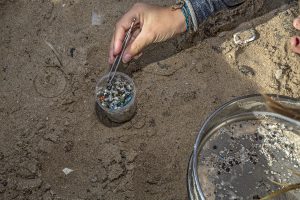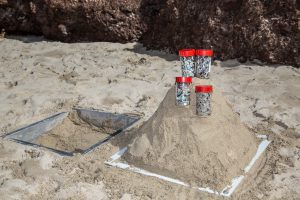This Wednesday, scientists from the EPHEMARE project will come on board Race for Water. This project (which stands for “ecotoxological effects of microplastics in marine ecosystems”) brings together 10 European countries and 15 partner institutions. The team will collect, sample, and analyze plastics from Bermuda’s waters, and their schedule is packed with activities. We recently spoke with Jérôme Cachot, a research professor from the EPOC lab at the University of Bordeaux, France. Dr. Cachot discussed the study that he is about to conduct, collaborating with his European colleagues.
Race for Water: What are you planning to study while you’re on board Race for Water?
Jérôme Cachot: We’re coming to Bermuda to study microplastics contamination, and the effect of microplastics on marine life—both invertebrates and fish. In our laboratory—EPOC is associated both with France’s CNRS National Scientific Research Center and with the University of Bordeaux—we look at the effects of two types of microplastics. Some are what we call “clean” plastics, meaning that they’re free of pollutants; the others are artificially infused with pollutants. On board Race for Water, we’ll be able to collect microplastics that have naturally absorbed pollutants from the environment. That will give us an idea of the actual pollution levels in the areas where plastics concentrate in the oceans.
R4W: Does this mean that you’re studying pollution that’s transported on microplastics?
JC: When plastics float in the ocean, they absorb pollutants from the water—for example PCBs (polychlorinated biphenyls). Those pollutants aren’t typically water-soluble, but they have a strong affinity for organic materials, and they concentrate in plastics. During Race for Water’s 2015 Odyssey, we were able to show that there are a tremendous amount of microplastics on and in Bermuda’s beaches, and we studied the associated contamination. Now, the challenge is to go see what’s happening in the ocean and in ocean sediments. We need to study the variety of molecules that these plastics absorb, to determine their toxicity levels in the water. Then we need to analyze the impact of this invisible pollution on the entire food chain.


Beach sampling during the first Odyssey, 2015
R4W: Why is the mixture of molecules in these pollutants so dangerous?
JC: Modern-day pollutants are mostly synthetic, meaning that they’re man-made. They’re also mostly compounds of multiple molecules. At present, 10,000 different substances identified as pollutants are being used in Europe. When a molecule exists in isolation, we usually know how toxic it is, because the European authorities require a substance to be documented as harmless before it goes to market. But once that substance is out in the environment, it interacts with other molecules. Those interactions can change a molecule’s basic toxicity, and we still have very little knowledge about the actual toxicity of those mixtures of pollutants. Because microplastics absorb numerous free-floating pollutants in the oceans, they may prove to be more toxic than they were in their original state. Sampling them and then testing their effects on the development of marine organisms will give us a better idea of the actual toxicity of plastics as they age in the oceans.
R4W: What made you decide to conduct this study on board Race for Water?
JC: We had already worked with the Race for Water Foundation in 2015, doing an initial mapping of the distribution of microplastics on islands near ocean gyres. That study will be our starting point as we measure the plastics levels on ocean beaches. Now we have to take the next step and see what’s happening directly in the waters off Bermuda, for example. This will give us a better understanding of the impact of plastics pollution. Race for Water and the Race for Water Foundation have the infrastructure that we need for this kind of sampling, and for the analyses that we want to do. It’s a pleasure to be able to continue our work in this way. In addition, thanks to Race for Water’s reputation, we can raise public awareness while educating people at the same time. As a researcher, I feel an obligation to fulfill that type of role.